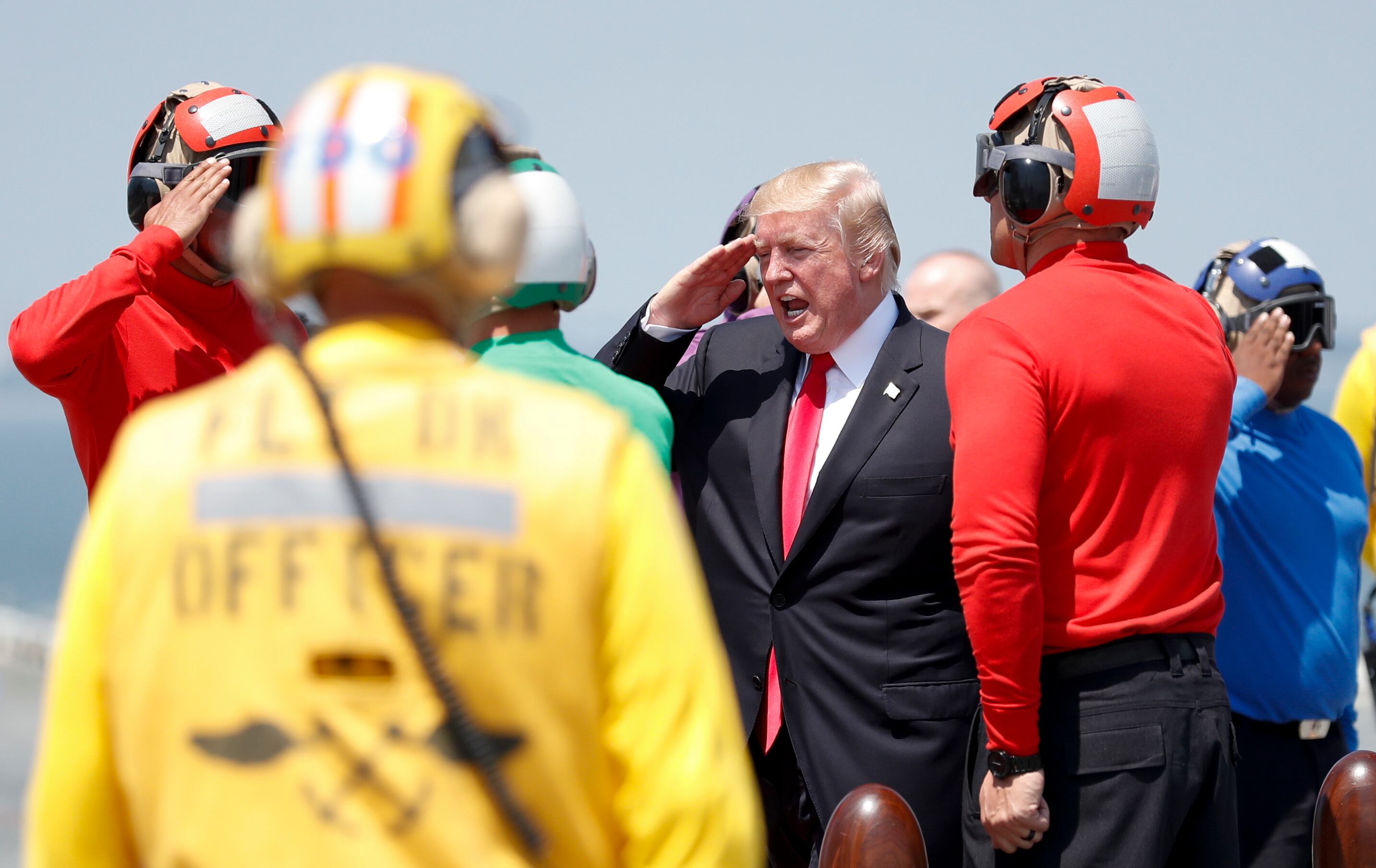WASHINGTON — The House passed legislation Friday with limits on President Donald Trump’s ability to strike Iran without the consent of Congress, one of several proposed provisions to curb his war powers that were added to the annual defense policy bill.
Among other provisions that attracted progressives but mostly repelled Republicans in the House, the war powers language could get attention in the Senate, where lawmakers on both sides of the aisle have sought to check the president on foreign policy.
The chamber voted along partisan lines, 220-197, to advance the bill that authorizes $733 billion for fiscal 2020. That’s $17 billion less than the White House and Republicans were seeking.
The additions to the bill reflect House Democrats’ desire to rein in Trump on military matters, notably through a bipartisan amendment to bar the president from offensive action against Iran without Congress’ express authorization. That measure passed 250-170, as 27 Republicans voted with the majority and seven Democrats voted with the minority.
“This is a historic moment for Congress,” said Rep. Ro Khanna, one of the co-sponsors. “Although President Trump campaigned on ending costly wars oversees, his ... actions to increase tensions with Iran prove he is far from living up to that promise. With more than 25 Republicans voting in favor of passage, this amendment is proof that opposition to war with Iran transcends partisan politics."
RELATED

The measure brought together Khanna, first vice chair of the House Progressive Caucus, and co-sponsor Rep. Matt Gaetz, R-Fla., known for his staunch support of the president on Fox News and on Twitter. Their action comes after Trump in June reversed course on a military strike against Iran.
“If [U.S. troops] must deploy the patriotism to go downrange and win this war, we should at least have the courage to vote for it or vote against it — every darn one of us,” Gaetz said Thursday, challenging hawkish lawmakers to request congressional authorization. “Let them make the case to Congress and the American people, and let them show the military families what their loved ones will fight and die for.”
But GOP lawmakers argued the amendment would complicate the commander in chief’s ability to respond to Iranian provocations and bar an immediate response if Iran were to attack Israel, Saudi Arabia or an allied tanker in the Straits of Hormuz. The House Armed Services Committee’s top Republican, Rep. Mac Thornberry, R-Texas, said military commanders told him the language would limit them too much.
“We have a number of ways that are not war but are the legitimate use of force, where the people who have to live under it think this goes too far and presents them from doing what they need to do,” Thornberry said. “This is only good news for Iran.”
RELATED

The bill comes as the Senate’s Republican majority defeated a similar war authorization measure last month, 50-40, meant to bar Trump from launching a military strike against Iran without Congress’ permission.
An amendment from Reps. Barbara Lee, D-Calif., and Justin Amash, I-Mich., would repeal the 2002 Authorization for Use of Military Force against Iraq. The measure passed with a strong, bipartisan 242-180, as 176 Republicans voted with the majority and four Democrats voted with the minority.
The sponsors argued the AUMF had been stretched far beyond its original intent, while the House Homeland Security Committee’s top Republican, Rep. Michael McCaul, called it “dangerous” and said it would shutter U.S. counterterror operations around the globe.
Another amendment from Khanna would cut off U.S. support for the Saudi-led coalition’s military operations against Houthi rebels in Yemen. It passed 240-185, with 12 Republicans and one Independent joining the majority and five Democrats joining the minority.
The chamber already approved a prohibition on the transfer of defense articles or services to Saudi Arabia or the United Arab Emirates under the emergency authority of the Arms Export Control Act. Lawmakers have been displeased by Trump’s use of an emergency declaration to bypass Congress and make the sales.
The House also agreed to a one-year prohibition on the sale of air-to-ground munitions used in the conflict in Yemen to Saudi Arabia and the UAE, while providing an exemption for any export or license suspensions that would incur a cost to the U.S. government.
RELATED

The uptick in congressional action has been fueled by civilian casualties in the Saudi-led air campaign against the Houthis in Yemen as well as the death of Washington Post columnist Jamal Khashoggi. Western intelligence agencies accuse the Saudi crown prince of ordering the killing of the journalist at a Saudi consulate in Turkey.
In the Senate in recent months, Republicans have joined Democrats to pass similar measures, but not enough to override a presidential veto.
In March, the U.S. Senate voted 54-46 to end U.S. support for the Saudi-led coalition fighting in Yemen. In June, the Senate voted 53-45 and 51-45 to block White House plans for $8.1 billion in military sales to Saudi Arabia and the UAE, respectively.
Mostly along party lines, the House passed an amendment from Progressive Caucus co-chair Pramila Jayapal, D-Wash., ordering the Pentagon to provide a broad report on how it would cut its own budget. Opposed by Republicans, it would require options for reducing the nuclear arsenal, service contracts, force structure, overseas presence and weapons system costs.
The House was only willing to go so far on the topic, and another Lee amendment ― to slash $17 billion from the operations and maintenance portion of the 2020 war budget ― met a sound bipartisan defeat, 115-307.
Joe Gould was the senior Pentagon reporter for Defense News, covering the intersection of national security policy, politics and the defense industry. He had previously served as Congress reporter.





